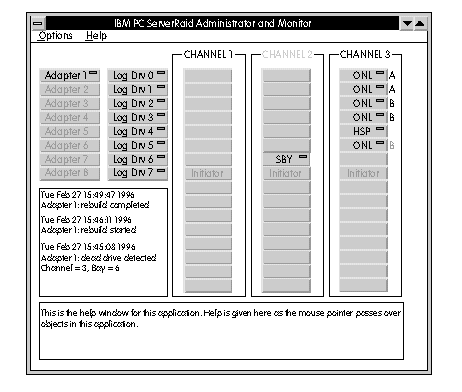

|
51.128 bytes |
Service Hints & Tips |
Document ID: GKEY-3H8AWN |
PC Server 704 - PC ServeRAID
Applicable to: World-Wide
PC ServeRAID
The following configuration information and procedures apply only to servers that have a PC ServeRAID adapter installed.
|
Note | |
|
You can use the Administration and Monitoring program or the ServeRAID configuration program for the following tasks. By using the Administration and Monitoring program from the active operating system desktop, you do not have to restart the server. Refer to the README file on the Administration and Monitoring program for instructions for the operating system. |
Device Drivers
The ServeRAID adapter requires the installation of device drivers. See the README file on the Device Driver/Administration and Monitoring diskette for detailed instructions.
If the operating system is installed from the ServerGuide CD, the device drivers will be installed automatically. However, if the operating system is installed from diskettes, the device drivers must be installed. See the README file on the Device Driver/Administration and Monitoring diskette for installation instructions.
Administration and Monitoring Utilities
The Administration and Monitoring program contains RAID monitoring utility programs for several operating systems that the ServeRAID adapter supports. You can monitor the ServeRAID configuration program in the local and remote systems by using these programs.
The following is an example of an Administration and Monitoring program screen.

Monitoring the Adapter Status in a Local System
The Device Driver/Administration Monitoring Program diskette provides monitoring programs that you can use to perform disk-array maintenance tasks. Because the monitoring programs reside on top of the operating system, you do not need to restart the server. Instead, you can perform tasks such as the following from the active operating system desktop:
- Select the adapter that you want to monitor.
- View information about drives connected to the adapter, and change the drive state.
- Reassign a drive to replace a defunct drive.
Some operating systems provide additional features, such as adding and deleting a logical drive. Refer to the README file on the Administration and Monitoring program for specific information and installation instructions.
Monitoring Adapter Status from a Remote System
The ServeRAID Administration and Monitoring programs support the Client/Server environment using TCP/IP on a variety of platforms. The server programs run on the system containing a ServeRAID adapter and is supported on a number of operating systems. See the README file on the Administration and Monitoring program for more information. The Client program runs in various Windows environments:
Windows NT Server Version 3.51
Windows NT Workstation Version 3.51
Windows 95
The Client program includes many of the functions contained in the ServeRAID configuration program. Because it resides on top of the operating system, you do not need to restart the server to add and remove capacity dynamically when creating or deleting an array. You can start the Administration and Monitoring program from the active operating system desktop.
This monitoring program allows you to:
- View the ServeRAID configuration and associated devices
- Reassign a drive to replace a defunct drive
- Create a logical drive
- Create an array
- Delete an array
In addition, in an array that contains only one logical drive, and the total number of logical drives in all arrays is less than 7, you can change the logical drive RAID level from level 0 to level 5 (or level 5 to level 0).
See the README file on the Administration and Monitoring program for instructions on installing and using this monitoring utility.
|
Search Keywords |
| |
|
Hint Category |
RAID, Hardware Maintenance Information | |
|
Date Created |
19-05-97 | |
|
Last Updated |
11-02-99 | |
|
Revision Date |
11-02-2000 | |
|
Brand |
IBM PC Server | |
|
Product Family |
PC Server 704, ServeRAID | |
|
Machine Type |
8650, Various | |
|
Model |
Various | |
|
TypeModel |
| |
|
Retain Tip (if applicable) |
| |
|
Reverse Doclinks |